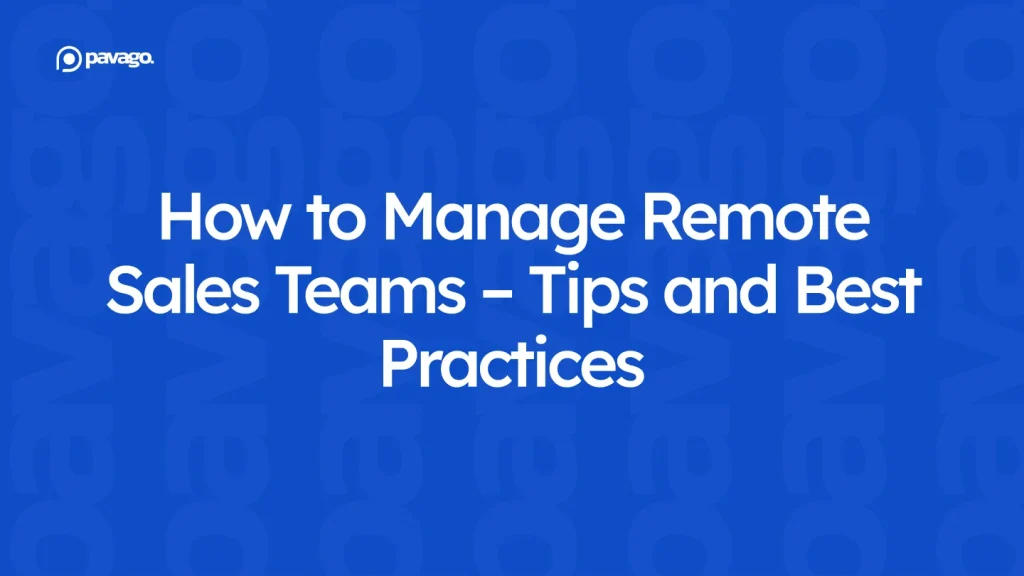Managing a remote sales team is no small feat.
As sales increasingly move into virtual environments, leaders must adapt to new challenges while fostering team cohesion, motivation, and productivity.
Remote work offers flexibility, access to a global talent pool, and cost efficiency, but it also comes with hurdles like communication gaps, accountability concerns, and maintaining a high-performance culture.
With over a decade of experience managing a remote sales team, we’ve learned that leading remote teams requires thoughtfulness, structure, and consistent effort.
Whether you’re a seasoned sales manager or just transitioning to remote leadership, this guide provides actionable insights, best practices, and real-world tips to drive your team’s success, so you don’t have to worry about how to manage a remote sales team.
Managing a Remote Sales Team: Pro Tips and Best Practices

According to The LinkedIn State of Sales Report 2021, 67% of sales managers think managing a remote sales team is more challenging than expected. However, In my opinion, remote team management is all about building trust, maintaining focus, and motivating your sales reps.
Here are 5 best practices we’ve learned to help you manage a remote sales team like a pro.
1. Set Clear Goals and Expectations
A remote sales team thrives on clarity. Unlike in-office teams where managers can quickly align expectations in person, remote environments demand a proactive approach to setting goals and expectations.
How to Do It Right?
- Define SMART Goals: Break down objectives into Specific, Measurable, Achievable, Relevant, and Time-bound targets. For instance, “Increase monthly revenue by 20% by the end of Q3” gives clarity and direction.
- Share a Sales Playbook: Equip your team with a well-documented playbook that outlines processes, messaging templates, CRM workflows, and prospecting guidelines. This ensures uniformity across all sales activities.
- Establish Non-Negotiables: Clarify expectations around responsiveness, availability during working hours, and adherence to sales processes. A structured environment minimizes confusion and creates accountability.
💡 Pro tip: Our sales manager shared how introducing a “common sales dashboard” transformed their team. By displaying real-time performance metrics and goal progression, team members were motivated to meet (and exceed) their targets. The transparency spurred healthy competition and collaboration.
2. Hire the Right People

Remote sales roles demand more than just sales acumen; they require self-motivation, discipline, and adaptability. Hiring the right salespeople ensures your team doesn’t just perform but thrives.
Traits to Look For:
- Self-Starter Attitude: Look for candidates who take initiative without constant supervision. During interviews, ask questions like, “Can you share an example of how you’ve solved a problem independently?”
- Communication Skills: Remote teams rely heavily on written and verbal communication. During the hiring process, assess a candidate’s ability to articulate ideas clearly.
- Tech Proficiency: Remote sales tools—from CRMs to video conferencing platforms—are critical. Ensure candidates are comfortable navigating technology.
How to Hire the Best Salespeople?
- Conduct video interviews to gauge how candidates present themselves virtually.
- Use role-specific tests to evaluate critical skills, like creating a prospecting email or delivering a virtual pitch.
- Hire globally to tap into diverse talent pools, but ensure they align with your team’s time zones and work culture.
💡 Pro Tip: During sales interviews, ask scenario-based questions like, “How would you manage a high-priority client who is unresponsive?” Their response will reveal their problem-solving skills and independence.
3. Provide Training and Development

Remote sales teams need robust sales onboarding and continuous learning opportunities to stay competitive and engaged. Without face-to-face interactions, managing a remote sales team requires a fresh approach to onboarding, training, and keeping the team engaged and productive.
What are the best practices for training and onboarding remote sales teams?
- Onboarding That Sets the Tone: Design a structured onboarding program that introduces company values, sales processes, and product knowledge. Include video modules, shadowing opportunities, and practice sessions.
- Continuous Learning: Offer access to online sales courses, certifications, and webinars. Platforms like LinkedIn Learning and HubSpot Academy are great for upskilling.
- Role-Specific Development: Tailor training programs based on roles. For example, SDRs (Sales Development Representatives) benefit from objection-handling workshops, while Account Executives may need negotiation training.
💡 Pro Tip from Our Sales Manager
“A manager plays a pivotal role in training SDRs. Personalized coaching, feedback, and structured sales processes accelerate skill development and reduce the learning curve. Starting each day with a team video call ensures punctuality and sets a positive tone.”
4. Motivate and Inspire

Motivation can wane when team members work in isolation. To keep spirits high, you need to foster connection, recognize achievements, and inject energy into daily operations.
Strategies to Motivate Your Remote Sales Team
- Shoutouts and Recognition: Highlight individual and team achievements during meetings or on Slack. For instance, “Shoutout to Sarah for closing the $50K deal today!”
- Create Healthy Competition: Set up leaderboards on your sales dashboard and reward top performers with incentives like gift cards, extra PTO, or public recognition.
- Celebrate Small Wins: Don’t wait for the quarter to end to celebrate success. Acknowledge milestones, such as scheduling 10 demos in a week.
- Build Camaraderie: Host virtual happy hours, trivia games, or coffee chats to encourage informal interactions.
💡 Murtaza, Sales Manager at Pavago, shared: “One remote team I managed introduced a ‘Deal of the Week’ shoutout in our group chat. It quickly became a ritual everyone looked forward to, motivating reps to push harder and deliver standout results.
5. Monitor Performance and Provide Feedback

Accountability is the backbone of high-performing remote sales staff. Monitoring performance doesn’t mean micromanaging but staying informed and offering constructive guidance.
Tools and Techniques
- Use KPIs and Dashboards: Track metrics like calls made, demos scheduled, pipeline progress, and deal closures. Tools like Salesforce and HubSpot CRM make it easy to visualize performance data.
- Frequent 1:1 Check-Ins: Schedule weekly or bi-weekly calls with each team member to discuss challenges, provide feedback, and align goals.
- Daily Debriefs: Our sales team occasionally ends the day with a short debrief. While not necessary daily, it helps address immediate roadblocks and reinforces team alignment.
Feedback Framework
- Start with Positives: Acknowledge what the rep is doing well.
- Address Areas of Improvement: Be specific. Instead of saying, “You need to prospect better,” say, “Your email open rates are below 15%. Let’s work on refining your subject lines.”
- End on an Encouraging Note: Inspire confidence and motivate your team members to improve.
Practical Tips and Insights to Manage Sales Teams

Managing a remote sales team isn’t limited to using the latest tools or scheduling check-ins—it’s about creating an environment where your team feels supported, engaged, and aligned with your goals.
As a manager, your role extends beyond tracking performance—you’re also a coach, a motivator, and a problem solver. Here are 3 practical tips that have proven effective for remote sales managers.
1. Prioritize Communication
Communication is the lifeblood of outsourced sales teams. Consistent, transparent, and varied communication keeps everyone aligned and engaged.
- Daily Stand-Ups: Start the day with a quick video meeting to review goals and share updates. This fosters punctuality and team connection.
- Use Collaborative Tools: Platforms like Slack, Zoom, and Microsoft Teams enable seamless communication.
- Leverage Asynchronous Channels: Not everything needs a meeting. Use email or shared documents for updates that don’t require immediate interaction.
2. Cultivate a Strong Team Culture
Remote doesn’t have to mean disconnected. Build a culture where team members feel valued and included.
- Share team successes publicly to create a sense of pride.
- Encourage cross-functional collaboration through brainstorming sessions or joint projects.
- Foster inclusivity by celebrating cultural milestones and diverse perspectives.
3. Adapt and Iterate
Remote work evolves, and so should your management approach. Regularly assess what’s working and tweak your strategies accordingly.
- Conduct anonymous surveys to gather team feedback.
- Stay updated on trends and best practices for remote team management.
- Be flexible and open to experimenting with new tools or methods.
Final Thoughts
Managing a remote sales team requires balancing structure with flexibility, accountability with motivation, and process with personal connection. By setting clear goals, hiring the right talent, fostering continuous learning, motivating your team, and maintaining accountability, you can build a thriving remote sales force.
As a sales manager, your role isn’t just about hitting numbers; it’s about creating an environment where your team can succeed despite the physical distance. By embracing the tips and best practices outlined here, you’ll position your team—and yourself—for long-term success in the evolving world of remote sales.
Remember, the best remote sales managers don’t just adapt to change—they lead it. So, start implementing these strategies today and watch your team excel.
Hire Remote Sales Teams with Pavago
Ready to build a high-performing remote sales team without the hassle? Pavago connects businesses with top-tier remote sales talent from around the globe. Whether you’re looking for Sales Development Representatives (SDRs), Business Development Representatives (BDRs), or experienced Account Executives, we’ve got you covered.
Our unique approach combines recruitment expertise with a deep understanding of remote work dynamics. We’ll help you hire the top 1% of offshore sales talent in 21 days or less, ensuring they’re a perfect fit for your goals and culture.
Sales Roles You Can Hire
Sales Development Representative
Business Development Representative
Inbound Sales Representative
Don’t let the distance stop you from achieving your sales goals.
👉Visit us today to discuss your hiring needs and transform your sales team!
Hire smarter, grow faster, and build a remote sales team that delivers results.
















